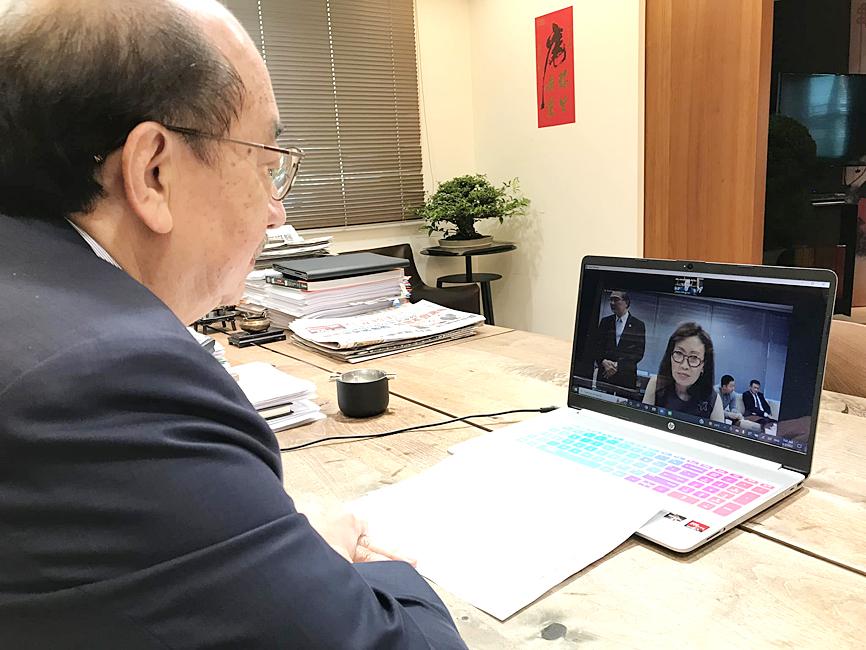Democratic Progressive Party (DPP) caucus convener Ker Chien-ming (柯建銘) and US Representative Michelle Steel yesterday discussed in a teleconference the US’ proposed “Taiwan democracy defense lend-lease act” and further economic collaborations between the two countries.
Ker said that Steel is a long-time supporter of Taiwan and has often urged the administration of US President Joe Biden to guarantee Taiwan’s safety, and praised Taiwan’s COVID-19 pandemic prevention efforts.
The bill, cosponsored by Steel along with US senators Marsha Blackburn and Rick Scott, would authorize the expedited lending or leasing of defense equipment to Taiwan.

Photo: screen grab from Ker Chien-ming’s Facebook account
In addition, the bill would allow the US to send weapons to Taiwan with a proposed 12-year window for repayment for their lending or leasing.
Taiwan thanked Steel and the two other lawmakers for supporting Taiwan, and for stepping outside the traditional “box” of arms sale packages to propose an innovative and meaningful bill, Ker said.
Current arms package processes are extremely complex, and the bill could bolster Taiwan’s self-defense capabilities, Ker said, adding that he hoped the bill is supported in the House of Representatives and the Senate.
Steel said she hoped the bill could clear Congress soon, adding that she had asked Biden in writing to authorize the Taiwan arms sales package quickly.
Ker told Steel during the call that, faced with Chinese aggression, Taiwan does not seek to escalate the situation nor provoke Beijing.
Still, Taiwan will not back away from defending itself, Ker said, adding: “The Taiwanese people have the confidence and the courage to defend our autonomy,” he added.
Ker and Steel also discussed increased opportunities to collaborate economically.
Steel voiced strong support for signing a US-Taiwan free-trade pact and Taiwan’s inclusion in the Indo-Pacific Economic Framework.
Ker thanked Steel for her support and said that Taiwan’s strengths in its economy, trade, science research and development, and industry allow it to contribute to world affairs.
He also asked Steel to call for the US to support Taiwan’s inclusion in international organizations.

Chinese spouse and influencer Guan Guan’s (關關) residency permit has been revoked for repeatedly posting pro-China videos that threaten national security, the National Immigration Agency confirmed today. Guan Guan has said many controversial statements in her videos posted to Douyin (抖音), including “the red flag will soon be painted all over Taiwan” and “Taiwan is an inseparable part of China,” and expressing hope for expedited reunification. The agency last year received multiple reports alleging that Guan Guan had advocated for armed reunification. After verifying the reports, the agency last month issued a notice requiring her to appear and explain her actions. Guan

The Kaohsiung Tourism Bureau audited six hotels in an effort to prevent price gouging ahead of Korean band BTS’ concert tour in the city scheduled for Nov. 19, 21 and 22 this year. The bureau on Friday said that the audits — conducted in response to allegations of unfair pricing posted on social media — found no wrongdoing. These establishments included the local branches of Chateau de Chine, Hotel Nikko, My Humble House, and Grand Hai Lai, it said, adding that the Consumer Protection Commission would have penalized price gougers had the accusations been substantiated. The bureau said the Tourism Development Act

BACK TO WINTER: A strong continental cold air mass would move south on Tuesday next week, bringing colder temperatures to northern and central Taiwan A tropical depression east of the Philippines could soon be upgraded to be the first tropical storm of this year, the Central Weather Administration (CWA) said yesterday, adding that the next cold air mass is forecast to arrive on Monday next week. CWA forecaster Cheng Jie-ren (鄭傑仁) said the first tropical depression of this year is over waters east of the Philippines, about 1,867km southeast of Oluanpi (鵝鑾鼻), and could strengthen into Tropical Storm Nokaen by early today. The system is moving slowly from northwest to north, and is expected to remain east of the Philippines with little chance of affecting Taiwan,

The military yesterday said it has located the flight data recorder, or black box, of an F-16V jet that disappeared off eastern Taiwan earlier this month, and it would soon deploy a salvage team to try to retrieve it. Air Force Command Headquarters said that while it had pinned down the location of the black box, it was still searching for the aircraft’s sole pilot, air force Captain Hsin Po-yi (辛柏毅). Without providing details, the air force said it had located the black box days after detecting some intermittent signals and would now engage a team of professionals to retrieve it. The air